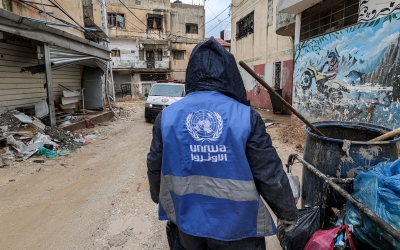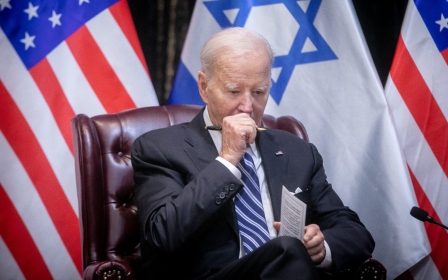Israeli influence campaign targeting African-American lawmakers on Gaza war: Report

An Israeli influence campaign is using hundreds of online avatars and fake social media accounts to attack Democratic lawmakers critical of Israel and promote news articles disapproving of the United Nations Palestine refugee agency (Unrwa), according to a report by the Israeli online watchdog, Fake Reporter.
According to the report, the targeted campaign has used more than 600 avatars, sending out 58,000 tweets and social media posts to circulate articles published by The Guardian, CNN and Wall Street Journal, among other major news outlets that amplify Israel’s position on the war.
The campaign relies on three major social networks, UnFold Magazine, Non-Agenda and The Moral Alliance, which were created prior to the war in Gaza. But the Hamas-led 7 October attack on southern Israel sent the accounts into round-the-clock posting.
The sites, according to Fake Reporter, are geared specifically to a “progressive audience”, publishing content on climate change, AI regulation, and human rights, in addition to the war in Gaza. They have more than 43,000 followers across Facebook, Instagram and Twitter.
The avatars promoting the content talk up their identity with lines like, “As a middle-aged African American woman” and use hashtags like #FaithJourney and #AfricanAmericanSpirituality.
New MEE newsletter: Jerusalem Dispatch
Sign up to get the latest insights and analysis on Israel-Palestine, alongside Turkey Unpacked and other MEE newsletters
The avatars were all created on the same day and their profiles were written with the same formula, subbing out just a few words. The declared gender and ethnicity of the avatars don’t match the profile photos, which have been taken from websites selling headshots.
The campaign works to amplify news stories published by major media outlets. First, the fake news sites share the reports. Then, the avatars share them across social media, including on the official accounts of Democratic lawmakers.
Avatars also shared social media posts showing video clips of what appeared to be Pro-Palestinian protestors calling for "massacres to be normalised" and calling for the US to "go to hell", contrasting that with peaceful protests of pro-Israel protestors.
In other cases, Avatars simply reshared widely published video clips of US lawmakers questioning the heads of Ivy League schools about antisemitism on campus.
At first, the campaign appeared to push out a wide assortment of reports from media outlets spanning the Jerusalem Post to The Guardian and Visegrád 24, a digital news site that publishes content favourable to right-wing Hungarian leader, Viktor Orban.
The avatars also promoted stories about antisemitism on US college campuses and “Judeo-Christian” values shared by Jews and African Americans.
But in January, the campaign upped its coverage of Gaza. One of the main stories circulated was a Wall Street Journal article that alleged Unrwa workers were involved in the 7 October attack.
The avatars posted reactions to the story, calling it “shocking” and “disturbing” on the social media accounts of US politicians and media companies.
According to the report, around 85 percent of all the US politicians targeted by the campaign were Democrats, and 90 percent of them were African Americans.
Ritchie Torres, a black Democratic Congressman with generally pro-Israel views, garnered the most social media engagement from the avatars. Other lawmakers targeted included Cori Bush; Lucy McBath; House minority leader Hakeem Jeffries; and Democratic Senator Raphael Warnock.
Israeli news site Haaretz reported in January that the Israeli government had launched an online influence campaign to respond to pro-Palestinian content and reports about Hamas.
It’s unclear whether the campaign revealed by Fake Reporter is part of that initiative.
But the influence campaign’s focus on progressive lawmakers comes as Israel has lost support within that group of the Democratic Party.
More than 31,000 Palestinians, mainly women and children, have been killed by Israel’s offensive on Gaza. Meanwhile, the UN is warning that northern Gaza is on the brink of famine.
The deteriorating situation has led even senior Democrats who are supportive of Israel, such as Senate majority leader Chuck Schumer, to call for elections in Israel to replace Israeli Prime Minister Benjamin Netanyahu.
This week, a group of more than 100 donors for the Democratic Party sent a letter to US President Joe Biden, warning him that his "unconditional support" for Israel's war on Gaza is increasing his odds of losing the upcoming presidential election.
The letter, reported by The New York Times, says that Israel's current military campaign in Gaza, in which Israeli forces have killed more than 31,000 Palestinians, is failing to achieve its own stated goals of eliminating the Palestinian group Hamas and freeing the remaining Israeli hostages held in Gaza.
"As donors and activists, we have committed much time and treasure in helping increase the turnout of likely Biden voters, particularly among young voters and voters of color," the letter states.
"Many of these voters are now questioning whether the Democratic Party shares their values. If they stay home or vote for a third-party candidate, there is the very real danger that President Biden will be defeated in November."
The letter goes on to say how the election of Donald Trump in November would be "a disaster for our country" and that the signatories "fear that the Gaza war is increasing the chances of that occurring".
Middle East Eye delivers independent and unrivalled coverage and analysis of the Middle East, North Africa and beyond. To learn more about republishing this content and the associated fees, please fill out this form. More about MEE can be found here.





